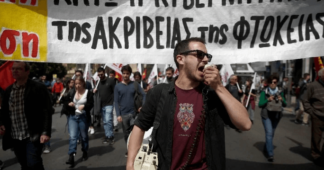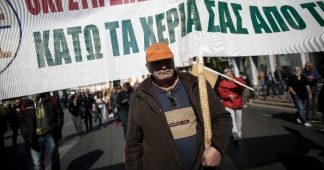Large parts of Italy were paralyzed in a one-day general strike organised by grassroots unions May 20. The strike was directed against NATO’s war policy and Mario Draghi’s government, as well as the social consequences of the war that are being imposed on the working class.
Workers of TNT/FEDEX near Milan airport strike against 176 dismissals and the sell-out by the CGIL, CISL and UIL unions [Photo by S.I. Cobas Peschiera Borromeo]. [Photo by S.I. Cobas Peschiera Borromeo]
The strikers also demanded higher wages, a sliding scale of wages to counter inflation (Scala mobile), improved social spending and secure jobs. “When, if not now” and “Get out of the war!” were the main slogans.
Train services were severely restricted nationwide throughout the day Friday, May 20. Public transport in Milan, Rome and elsewhere only maintained emergency services at peak times. Workers running ferry services to the islands, along with many flights and motorway toll booths were on strike.
Many state schools remained closed, as did supermarkets such as Lidl and large parts of the transport and logistics sector. There were also stoppages in industry, for example at commercial vehicle manufacturer Iveco in Turin. Delivery drivers in Milan and textile workers in Prato near Florence also stopped work. Rallies and demonstrations were held in the centres of Rome, Bologna, Genoa, Milan, Turin, Venice, Florence, Naples, Palermo and Taranto, as well as in many other cities.
The call to strike was made by the Italian grassroots unions, S.I. Cobas, Sgb, Unicobas, Cub and others. They have been gaining influence for years because the traditional trade union confederations CGIL, CISL and UIL are losing members in droves due to their pro-government and pro-business policies.
Many factories participating in the strike have been fighting ruthless levels of exploitation for years, such as garment workers in Prato and parcel delivery workers and drivers working for DHL, TNT and FEDEX. For example, FEDEX drivers in Peschiera Borromeo, where Milan airport is located, are on strike against a sellout by the union confederations, which have agreed to 176 redundancies.
The strikes against war and massive social cuts are an expression of the growing militancy of the international working class, fighting against growing inequality, the consequences of the coronavirus pandemic and the social effects of government war policies.
Moreover, the pandemic is by no means over. On the day of the recent general strike over 26,500 new infections and 89 COVID-19 deaths were reported in Italy.
Added to this are the price increases for fuel and food. The average price of heating gas in May 2022 is almost seven times higher than before the pandemic. The cost of bread has increased by 30 percent, and oil and pasta are also becoming more expensive. Purchasing power has fallen by at least 5 percent in the first quarter of 2022.
The crisis is hitting the Italian working class hard, which is already suffering from unemployment, precarious work and poverty among the elderly. With the approval of the government and trade unions, the corporations have used the pandemic to pile the costs onto the backs of workers in the form of layoffs, wage cuts and extended periods of short-time working. According to the Istat statistics office, more than 3.5 million workers are currently precariously employed; 430,000 were added in 2021 alone. Youth unemployment is officially 24.5 percent, but is much higher in real terms, especially in the south.
State employees, teaching staff and care workers are also coming under increasing pressure. Italy supports the Ukraine war—a proxy war by NATO against Russia—supplying it with weapons and stepping up spending on the Italian armed forces. In this context, the Draghi government has presented a new austerity budget. Among other things, it plans to cut the state education budget and to eliminate 9,600 teaching positions.
The general strike on May 20 was not the first in recent times. On April 22, workers all over Italy stopped work for one day under the slogan “Up wages, down arms!”
On March 14, ramp workers at Pisa airport refused to load weapons and ammunition for Ukraine, which were to be disguised as “humanitarian aid.” At the end of March, an arms shipment was stopped that was supposed to go to Yemen via the port of Genoa. The boycott by dockworkers in Genoa was also joined by colleagues in the port of Livorno.
These strikes are being organised by grassroots unions, which have gained great influence in recent years mainly because the traditional trade union confederations CGL, CISL, UIL, which are linked to the establishment parties, shamelessly support the government. Time and again they have sold out workers.
Shortly after the strikes and boycott actions began, the government organised a police raid on the premises of the grassroots union USB (Unione sindacale di base) in Rome on April 6, ostensibly to search for hidden weapons. It was a provocation and a transparent attempt to intimidate the growing resistance.
All this has contributed to even more workers taking part in the general strikes of April 22 and May 20.
The growing readiness to fight raises more and more urgently the question of an independent perspective and orientation. While workers want to fight against the war, social cuts and the government’s herd immunity policies, the grassroots unions organise strike actions in order to keep control of the growing class struggle movement and steer it into harmless channels.
Organisations like the USB and Cobas pursue a nationally limited, syndicalist perspective that has failed in every country and ultimately falls in behind the government and its capitalist policies. Despite their nominal grassroots orientation and federal structure, they are not fundamentally different in political orientation from the hated national trade union confederations
excerpt from www.wsws.org
We remind our readers that publication of articles on our site does not mean that we agree with what is written. Our policy is to publish anything which we consider of interest, so as to assist our readers in forming their opinions. Sometimes we even publish articles with which we totally disagree, since we believe it is important for our readers to be informed on as wide a spectrum of views as possible.










